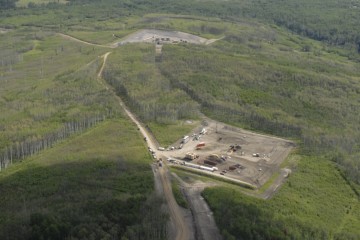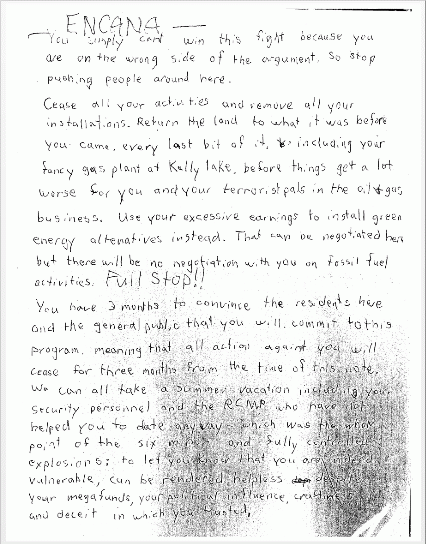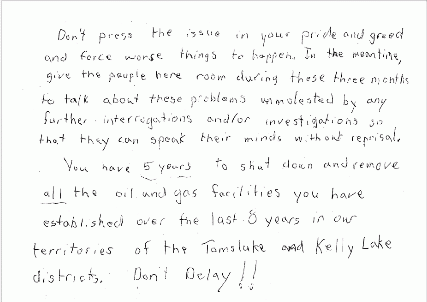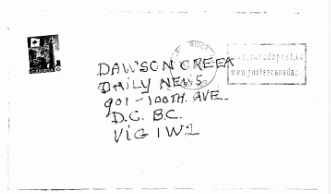

BOMB: Letter gives EnCana three months to leave or attacks will 'get a lot worse'
Nathan VanderKlippe and Wendy Stueck
Globe and Mail
Friday, Jul. 17, 2009
 Two-page letter sent to newspaper promises 'summer vacation' free of bombings, but warns that could change |
A letter sent to a daily newspaper and addressed simply to “EnCana” says attacks against the company will stop for three months to give it a chance to leave the area.
“We can all take a summer vacation including your security personnel and the RCMP who have not helped you to date anyway,” the letter states, adding that the six explosions that have occurred so far have been minor and controlled to make the point that “you are indeed vulnerable, [and] can be rendered helpless.”
The letter, delivered to the Dawson Creek Daily News Wednesday and released yesterday by the RCMP, is the second sent in connection with a string of attacks against EnCana wells and pipelines. The first letter was sent to local newspapers in October, days before the first blast occurred.
Police believe the two hand-printed letters were drafted by the same person. The first was sent from Dawson Creek; the second from Spirit River, Alta., which is located 95 kilometres to the east.
Spirit River is relatively near the ranch owned by Wiebo Ludwig, the Alberta man who famously warred against the natural-gas operations of AEC, which merged with PanCanadian to form EnCana.
RCMP have said in the past they have ruled out Mr. Ludwig as a suspect, a statement they reiterated Thursday.
The B.C. explosions amount to “blackmail against not only industry, but also against the local community,” RCMP Sgt. Tim Shields told reporters in Dawson Creek.
RCMP have taken the deliberate step of calling the acts “terrorism,” a term Sgt. Shields said accurately describes the explosions, but carries with it no change in either police response or investigation funding.
In Dawson Creek, oil-and-gas workers whose jobs take them close to the bombing sites said they spend little time worrying about their safety, based on a belief that whoever is responsible is taking care to avoid hurting people.
“This guy who's doing this – he's not out there to hurt nobody,” said an oil-and-gas worker who attended the scene of the fifth bombing.
That wellhead explosion was just 500 metres from where the sixth blast went off, rupturing a natural-gas pipeline.
“He's just trying to get back at the oil companies,” said the worker, who spoke on condition of anonymity over his fear of losing his job for speaking out.
Clues in the two letters have led RCMP to believe that the person responsible – police believe it is most likely a single individual, who they have taken to calling “the bomber” – lives in or near Tomslake, B.C., a small community near the Alberta border.
Tomslake was populated by immigrants from the Czech Sudetenland around the time of the Second World War, and language used by the letter-writer indicates he or she could form part of that ethnic group, Cpl. Shields said. The first letter referred to “home lands,” while the second mentioned “our territories of the Tomslake and Kelly Lake districts.”
“We know that the Tomslake area was once referred to, especially after World War II, as the Sudeten homeland, and the word ‘territory' was also included in that description of Tomslake at that time,” Cpl. Shields said. “So, it was a term that was used in the past.”
From the tone and content of the letters, it appears the writer wants to come across as powerful, smart and in control, psychologist Mike Webster said yesterday.
The letter also carries elements of what's called “duping delight” – some criminals' tendency to gloat over their exploits or taunt police, a tendency that can backfire.
Such people may want to insert themselves into the investigation or collect souvenirs, said Mr. Webster, who's worked with police agencies for decades and recently testified at the Braidwood inquiry into the taser death of Robert Dziekanski.
“If he is more interested or has a greater need for demonstrating his intelligence or his power over EnCana and the police, he's going to screw up,” Mr. Webster said.
Mr. Webster disagreed with the RCMP's characterization of the attacks as terrorism, saying that the attacks appear aimed at the company, not the public at large.
“There's an argument to be made that the community is somewhat in support of the individual who is responsible,” said Mr. Webster.
The investigation has cost at least $1-million to date. There have been no arrests.
   |
RCMP scout locales in hunt for bomber
NATHAN VANDERKLIPPEGlobe and Mail
Friday, Jul. 17, 2009
RCMP in northern British Columbia have begun scouting for sites to set up a new, temporary detachment in the small town of Tomslake, where they suspect the area's oil and gas bomber resides.
Plans for the new detachment will be revealed today by RCMP, who gave advance notice of their intentions to a group of concerned residents in Tomslake yesterday.
“What I want is basically a full service police station out here,” Staff Sgt. Stephen Grant told about thirty people gathered for a Rural Crime Watch meeting last night. Mr. Grant is the commander of the 27-member Dawson Creek detachment.
Over the past nine months, six explosions have been set at natural gas installations in the area owned by EnCana Corp. The explosions have all happened in a relatively small area between Tomslake and Dawson Creek, which is a 30-kilometre drive north-west.
The six bombings have damaged infrastructure, but so far hurt no one.
Two anonymous letters sent to local media by the person believed to be responsible for the bombings have referenced Tomslake. Police believe the language in the letters – especially references to “our home lands” and “our territories” – points to a resident of the area, which was populated around the time of the Second World War by Czechoslovakian Sudetenlands immigrants. Some of those immigrants used that terminology to describe their new Canadian home.
Current plans call for the small satellite detachment to be maintained for six months, or until the bomber is caught, although Mr. Grant expressed hope that it could be continued beyond that time.
“We're looking at potential sites in the area,” he said in an interview. “We're working with the regional government to locate a spot, and we hope to get that going pretty quick.”
The RCMP bid to catch whoever is responsible for the bombings has damaged relations with some in the area, as people have been tailed, subjected to hostile questioning, watched in their own homes and, in one case, accused in a public restaurant of being the bomber.
Mr. Grant acknowledged those tactics have not always gone over well.
“We all know how this initial investigation was conducted,” he told the Tomslake group. “It did not leave a good taste in people's mouths.”
But he hopes the new detachment, even if it is temporary, will help mend some of those issues.
“We've always been too distant from the community here,” he said. “So the connection we have with the people isn't as strong as it should be. I believe by having a base here within the community we're going to be more responsive, we'll have a better connection with people. I think it's going to be positive all around.”
RCMP are also bringing in additional gunpower, including a six-month posting to the area for a long-serving member of the force who has trained as a sniper and worked with U.S. and Canadian army bomb patrols in Afghanistan.
Police must contend, however, with substantial elements of the community that believe the bomber is doing them a service.
Many have harsh feelings toward the natural gas development that has descended upon them in recent years with a cloud of highway dust and the roar of drilling rigs in a once-quiet place. As a result, enough people have sympathy for whoever is setting the explosions that one woman told Mr. Grant: “the bomber is at least giving us a bit of a voice.”
Police have attempted to convince people otherwise by pointing to the danger the explosions have posed to natural gas workers, including those whose work to repair the fifth explosion involved welding a repair mere centimetres from a roaring natural gas flame.
“This person would like to think they're Robin Hood, but they're endangering the people that live here,” Mr. Grant said.
Police believe the bomber has likely used an all-terrain vehicle to travel to the remote locations where the bombings were set. Members of the Tomslake Rural Crime Watch have nonetheless stepped up their own volunteer patrols, devoting long hours to driving the community's gravel roads in hopes of discovering something suspicious.
For them, the new detachment is entirely welcome.
“It's a necessary evil generated by the circumstances that have developed in our area,” said Rural Crime Watch chairman Geri Demyem.
See previous
Hunt for pipeline bomber draws harassment complaints
RCMP buoyed by new leads in B.C. pipeline bombings
RCMP say 6th bomb targeting B.C. pipeline caused small sour gas leak
Explosion caused pipeline leak, EnCana says
Tips flowing on pipeline bombings after EnCana reward offered
Encana to announce reward into B.C. pipeline bombings
Pipeline bombers probably local: expert
RCMP blows pipeline bombing investigation
Sabotage fears flow around B.C. pipelines
Third blast rocks B.C. pipeline
Six recent pipeline incidents, commission says
Posted by Arthur Caldicott on 17 Jul 2009